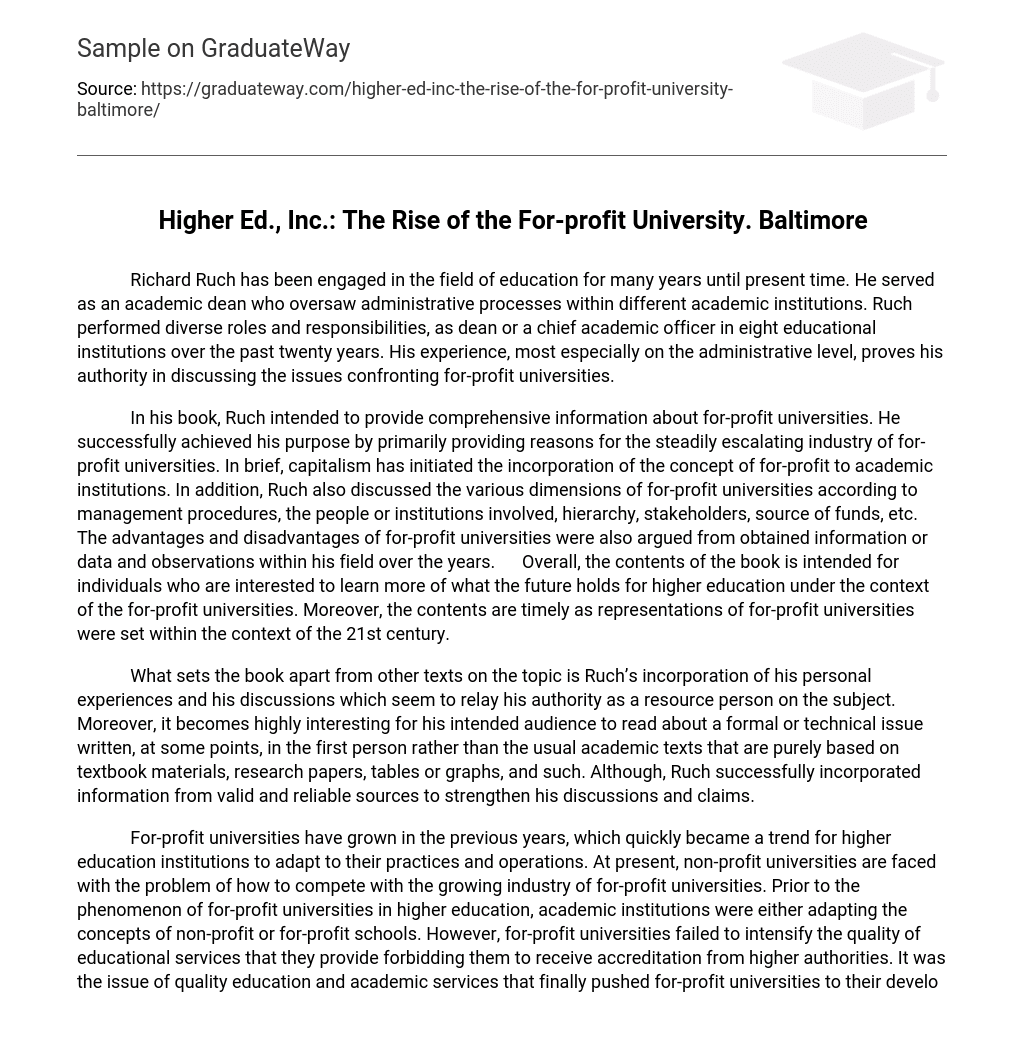Richard Ruch has been engaged in the field of education for many years until present time. He served as an academic dean who oversaw administrative processes within different academic institutions. Ruch performed diverse roles and responsibilities, as dean or a chief academic officer in eight educational institutions over the past twenty years. His experience, most especially on the administrative level, proves his authority in discussing the issues confronting for-profit universities.
In his book, Ruch intended to provide comprehensive information about for-profit universities. He successfully achieved his purpose by primarily providing reasons for the steadily escalating industry of for-profit universities. In brief, capitalism has initiated the incorporation of the concept of for-profit to academic institutions. In addition, Ruch also discussed the various dimensions of for-profit universities according to management procedures, the people or institutions involved, hierarchy, stakeholders, source of funds, etc. The advantages and disadvantages of for-profit universities were also argued from obtained information or data and observations within his field over the years. Overall, the contents of the book is intended for individuals who are interested to learn more of what the future holds for higher education under the context of the for-profit universities. Moreover, the contents are timely as representations of for-profit universities were set within the context of the 21st century.
What sets the book apart from other texts on the topic is Ruch’s incorporation of his personal experiences and his discussions which seem to relay his authority as a resource person on the subject. Moreover, it becomes highly interesting for his intended audience to read about a formal or technical issue written, at some points, in the first person rather than the usual academic texts that are purely based on textbook materials, research papers, tables or graphs, and such. Although, Ruch successfully incorporated information from valid and reliable sources to strengthen his discussions and claims.
For-profit universities have grown in the previous years, which quickly became a trend for higher education institutions to adapt to their practices and operations. At present, non-profit universities are faced with the problem of how to compete with the growing industry of for-profit universities. Prior to the phenomenon of for-profit universities in higher education, academic institutions were either adapting the concepts of non-profit or for-profit schools. However, for-profit universities failed to intensify the quality of educational services that they provide forbidding them to receive accreditation from higher authorities. It was the issue of quality education and academic services that finally pushed for-profit universities to their development in the field of education. Supporting this issue, Ruch’s description of the for-profit university as compared to the non-profit university sets the appeal that most students and stakeholders see in the promising future of for-profit universities.
For-profit universities are more appealing, most especially to students because education is driven by them and the teaching and learning process leans toward quality of outcomes and not the input being contributed by the faculty, the administration, and the investors. Moreover, earning a degree in for-profit universities increases a graduate’s chances of launching a promising career in the future. In terms of motive for establishing an academic institution, the for-profit university, as its name suggests, operates for profit. On the other hand, non-profit universities are more concerned with establishing a good reputation among students and other stakeholders. Another issue is that for-profit universities are driven by the investors and stockholders, while non-profit universities are sustained by donors. This sets the backdrop of the stability that exists in for-profit universities as funding will always be at hand. Non-profit universities, on the other hand, are always in a critical position in terms of sustainability in providing quality education. Overall, Ruch’s views were representative of the benefits and advantages of for-profit universities, not only for the money-making mechanisms or individuals and institutions behind it, but also for students who seek quality education for a better life and career.
My limited knowledge or expertise on the field of higher education, especially when it comes to the administrative aspect, will not be sufficient enough to validate or rationalize my assumptions. However, analysis and conclusions will be based on the fundamental issues presented by Ruch in his book. The structure of Ruch’s text is authoritative and valid, such that the author comes from a reputable and suitable background. Ruch’s experiences within the administrative level of higher education allowed him to present an educated and conversant text for his audience. Although the information presented by Ruch was comprehensive, covering the similarities and differences between the non-profit and for-profit universities, I believe that Ruch revealed a hint of bias leaning towards the interests and advantages of for-profit universities.
Although this is the case, Ruch still presented an all-inclusive information about for-profit universities, as was his purpose. The broad discussion about the matter will benefit individuals, most especially higher education institutions in making decision on whether to transform their universities into a for-profit one, or whether to establish a new university adapting non-profit or for-profit concepts. With this in mind, I perceive that Ruch’s success will be on the majority of academic institutions who will be swayed by his text to adapt the for-profit concept of administering educational services. Having this kind of influence, based on the positive reviews Ruch presented, is considered an accomplishment.
On the other hand, the overtly biased views, as mentioned in the previous paragraphs will leave the action of individuals or academic institutions who wants to justify the benefits and advantages of non-profit universities fruitless. Moreover, old and new academic institutions will be discouraged to adapt to the existing influence of non-profit universities as its counterpart appeals to most students and that the sustainability of providing quality education in terms of funding and resources exists. On the whole therefore, Ruch’s far-reaching exploration of the for-profit university would help to influence the future of higher education, such that his discussions and recommendations would usher the forthcoming prevalence of for-profit universities.





